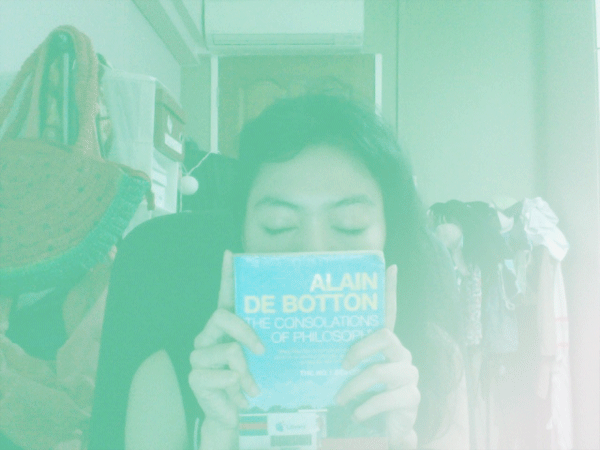had been having a vague desire to read an alain de botton's book for long because my friends whose opinions i appreciate a little above average retweeted a lot of his tweets, which subsequently prompted me to check out his twitter account as well, and found quite a lot of good thoughts that do not sound like overt, out-there wisdom a la paulo coelho's which not everyone would find applicable anyway; and so decided to follow him but was disappointed because he tweeted very rarely and often in times where i was not in my 'awakening' state

i initially thought i would pick 'architecture of happiness' because the title had that special ring but when i searched on library catalogue it said it was placed in the 'home & architecture section'; i thought 'wow this library is taking the title way too literally' but it was me who took the title too figuratively because indeed the book was about design and houses, which i no longer had interest in. i put back the book on the shelf and picked consolation of philosophy because i did not know much about philosophy and consolation that comes from books is sometimes more reliable, it has the quality of being human but not overly/obnoxiously too human because you see, when you offer consolation to another human it is difficult to provide one that is well-thought, no matter how much you desire to sympathize, whereas a book that is written by a human being expends more time in the process because of whatever kind of drive that gives birth to the book itself, so it is not just more well-organized, but also logical in a way that yeah it is possible nobody has told me this before, i need to know this/take this into consideration
the cover is a little bit 'icky' ie rose/tulip garden stretched across the landscape (although like most book covers, it is actually a 'portrait') with trees and sky as a backdrop perhaps to invoke 'serene' atmosphere that author/cover designer wanted to associate philosophy with
the book is good for general and historical knowledge but the thing with historical knowledge is that some people (i) tend to forget it over time and hence learn very little from it. the examples are often difficult to relate with in modern times too, for example epicurius says he obtains happiness with his own garden at the backyard because he depends very little on external influence. no it is nearly impossible if not at least laughable in singapore, although it may seem like a prerequisite for an 'ideal living' to some people (maybe a garden at the rooftop will be a good idea, go green you big cities)
the consolations of philosophy is peppered with a lot of pictures, ancient paintings, or mediocre pictures of houses or gardens swimming amidst the words to illustrate what the philosopher is talking about (although maybe different kinds of houses and gardens at their time, the book shows only those of 'our time') some of which i find quite helpful but the rest only elongates the list of references at the end of the book
what i find amusing about things from past (past here means, at least a few decades ago) in books/movies/media is how the records seem to glorify it, like most innovations have already occurred and there is no place for modern figures. sure steve jobs is a legend but you will not see him in such books. yet
time is an essential seasoning to heroic stories and sometimes the older, the better
however the book is enjoyable at some parts for example the part about clever people, and some conventional wisdom that is crafted with philosophical wrappings such as one below
a man may appear to the world as a marvel: yet his wife and his manservant see nothing remarkable about him. few men have been wonders to their families.the book explains this as
we may take this in two ways: that no one is genuinely marvellous, but that only families and staff are close enough to discern the disappointing truth. or that many people are interesting, but that if they are too close to us in age and place, we are likely not to take them too seriously, on account of a curious bias against what is at handand on books and authors as well
it's tempting to quote authors when they express our very own thoughts but with clarity and psychological accuracy we cannot match. they know us better than we know ourselves. what is shy and confused in us is succinctly and elegantly phrased in them, our borrowings from them indicating where we find a piece of ourseles, a sentence or two built of the very substance of which our own minds are made - a congruence all the more striking if the work was written in an age of togas and sacrifices. we invite these words into our books as a homage for reminding us of who we arethe montaigne part on cleverness also indicates thoughts in line with those expressed in franny and zooey, something along "what's the use of being smart if you're unhappy"

No comments:
Post a Comment